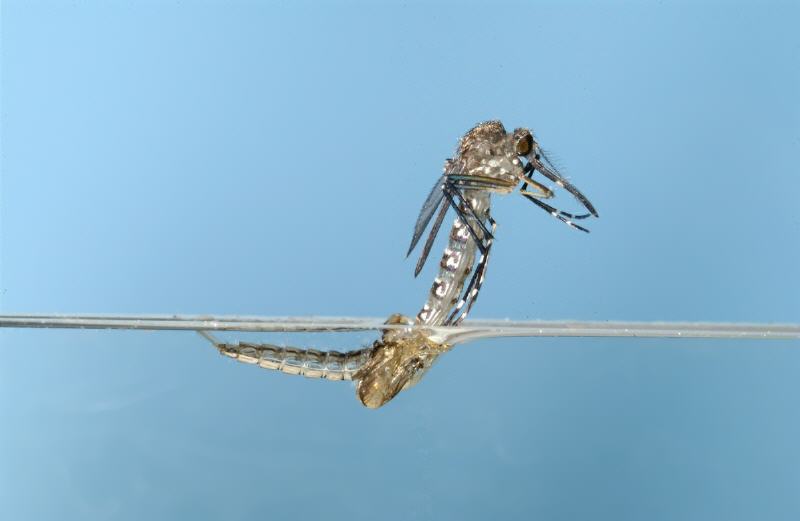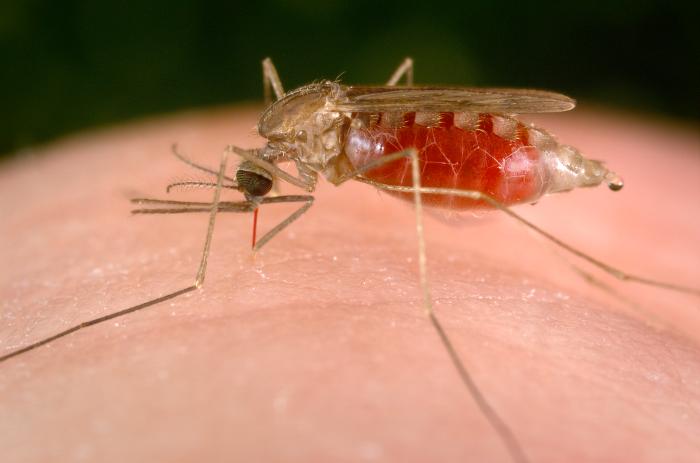Adult Mosquito Control Applications
Adult Mosquito Control
The Warren County Mosquito Commission works conscientiously to prevent populations of biting adult mosquitoes by focusing control during larval stages so that the mosquitoes will not make it to the adult stage. Occasionally however, the need arises in which use of an additional method of control targeting the adult biting mosquitoes, called adulticiding, is used. When adult mosquitoes are present, NO other type of control method performed by the Commission will work. Residents can limit exposure to biting adult mosquitoes through the use of repellents or by avoiding the outdoors completely.

Photo: MVCAC
An adult mosquito emerging from its pupal stage.

Photo: CDC PHIL # 6765
An adult female mosquito taking a blood meal.
Adulticiding targets adult mosquitoes as they are flying in a specific area. Prior to adulticiding taking place, a number of factors are considered related to the number and types(s) of mosquitoes present. These factors include but may not be limited to:
- Number of complaint calls generated by the public (which are verified to be caused by adult mosquitoes), and/or
- The level of human activity in a given area (for instance the human population in an area or whether athletic fields are nearby) , and/or
- Landing Rates and/or portable light trap collections performed by Commission staff at the complaint call sites, and/or
- Adult mosquito populations identified through the Commission’s routine adult mosquito surveillance program, and/or
- Adult mosquitoes noted by staff members during regular inspections within the county, and/or
- Adult mosquitoes collected during our routine disease surveillance program, especially if and when any mosquitoes tested are positive for a mosquito borne virus, and/or
- The presence of horses or other animals (such as birds) in the area that might be susceptible to infection from mosquito-borne diseases, and/or
- An indication that horses or other animals have tested positive for a mosquito-borne disease in a given area.
When adulticiding is determined to be an appropriate course of action, a truck mounted ULV (ultra low volume) sprayer is used that disperses a very fine mist made up of a small amount of insecticide.
Adulticiding is performed when the adult mosquitoes are flying, which is usually near dusk or after dark but can be in the early morning or even in the afternoon, depending on the mosquito species being targeted. While most mosquitoes are active at dawn and dusk, some mosquitoes fly in broad daylight and others wait until it is fully dark.
There are environmental variables that must also be taken into consideration in order for adulticiding to take place, these include: temperature (no spraying is done if it is too hot or too cold); wind speed (while some drift is necessary to have the spray impact the mosquitoes, conditions that are too windy are not effective); precipitation (no spraying takes place in heavy rain).
In compliance with Subchapter 9-9.10 of the NJ Pesticide Control Code (N.J.A.C. Title 7, Chapter 30), notice is hereby given that the Warren County Mosquito Extermination Commission, PO Box 388, 2 Furnace Street, Oxford, NJ 07863, will be applying Zenivex (active ingredient – Etofenprox), DeltaGard (active ingredient Deltamethrin), Merus (active ingredient Pyrethrins), Fyfanon (active ingredient Malathion) by truck mounted ULV (Ultra Low Volume) sprayer or by aircraft for the control of adult mosquito populations on an area wide basis, as needed, throughout the County of Warren, during the months of May through November of each year. For additional information on adult mosquito control activities contact Jennifer Gruener, Superintendent (pesticide applicator license #25339B) at 908-453-3585. Call the NJ Poison Information & Education System 800-222-1222 for emergencies, the National Pesticide Information Center 800-858-7378 for routine health inquiries and to obtain information about signs and symptoms of pesticide exposure. Call NJDEP Bureau of Pesticide Compliance and Enforcement 609-984-6568 for pesticide regulation information, pesticide complaints and health referrals. Upon request, the pesticide applicator or applicator business shall provide a resident with notification at least 12 hours prior to the application, except for Quarantine and Disease Vector Control only, when conditions necessitate pesticide applications sooner than that time. The Commission’s website, www.warrencountymosquito.org provides updated information on time and location of application(s).
Treatment Schedule for Adult Mosquitoes
What You Need to Know About Truck Spraying
Information for the products currently used for adult mosquito control and measures you can take to avoid exposure to the spray can be found on the Zenivex- NJDEP Fact Sheet, the Merus- NJDEP Fact Sheet, and the Fyfanon-NJDEP Fact Sheet or you can call the National Pesticide Information Center 1.800.858.7378 or visit their website at the following link: http://npic.orst.edu
